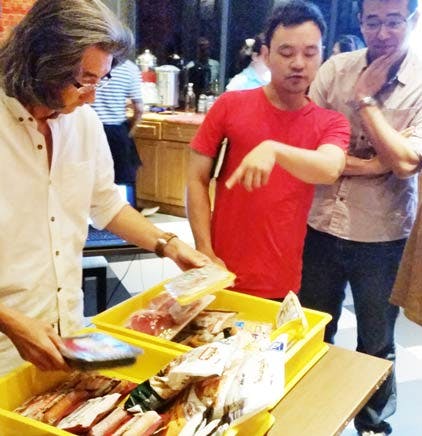Educational Programs Showcase U.S. Pork in Malaysia

Joel Haggard, USMEF senior vice president for the Asia-Pacific region, speaks to Malaysian importers during an educational program in Kuala Lumpur
Following Malaysia’s decision to grant access for uncooked U.S. pork products, USMEF recently conducted two educational programs in Kuala Lumpur. One session concentrated on Malaysian pork importers and distributors, while the other focused on expanding U.S. pork usage among foodservice customers.
“Further development of the Malaysian pork market appears promising, especially at independent restaurants that serve non-halal clientele, such as the country’s thousands of Chinese establishments,” said USMEF-ASEAN Director Sabrina Yin. “The programs conducted in Kuala Lumpur were designed to educate potential buyers of U.S. pork about the quality and availability of our products. We also provided information to help them with import procedures for fresh/frozen pork, since many have no experience with that process. ”
Malaysia’s population exceeds 30 million, but is more than 60 percent Muslim, which means opportunities for pork consumption growth are limited. But pork is popular among the residents who consume it. While Malaysia’s per capita pork consumption is only about 17 pounds per year, this translates to 43 pounds per year among the non-Muslim population.

Malaysian importers take a look at the packaging of various pork products during the pork sampling session
Yin pointed out that five U.S. processing plants have been approved by Malaysian authorities for export to the country. The approval process includes exporters of fresh/frozen pork filing a request to be added to Malaysia’s approved list through USDA’s Kuala Lumpur office. All uncooked pork products, including variety meat, are eligible, along with all processed pork items. Exporters must document that meat shipments include only pork, in order to avoid Malaysia’s halal certification requirements. Pork products commonly imported by Malaysian buyers include spare ribs, lacones, front feet, stomachs and jowls.
Europe, China, Vietnam, Canada and Australia are all competing with the U.S. for pork market share in Malaysia, which also relies heavily on domestic production. That production could face significant obstacles in 2016, when new environmental regulations are set to take effect. Only a small percentage of Malaysia’s hog farms is currently in compliance with these requirements.
There are also challenges involving Malaysia’s tax structure. While processed pork products are subject to the Goods and Services Tax (GST), livestock and fresh meat – both domestic and imported – are exempt. The GST is imposed, however, on services provided by importers and distributors, such as customs clearance and inland transport costs. Restaurant diners in Malaysia are also assessed GST on their meals, which traders say has negatively affected overall demand.

Tasting samples of U.S. pork products were provided to Malaysian importers during the USMEF programs
One encouraging sign in Malaysia’s retail food establishments involves supermarket sections dedicated to non-halal foods, where fresh pork and processed meat – including canned items – are displayed prominently.
“Although pork is not served in most hotels, items such as gourmet bacon are featured prominently at trendy new establishments such as the themed ‘Three Little Pigs and The Big Bad Wolf’ at Kuala Lumpur’s Tropicana Mall,” Yin said.
